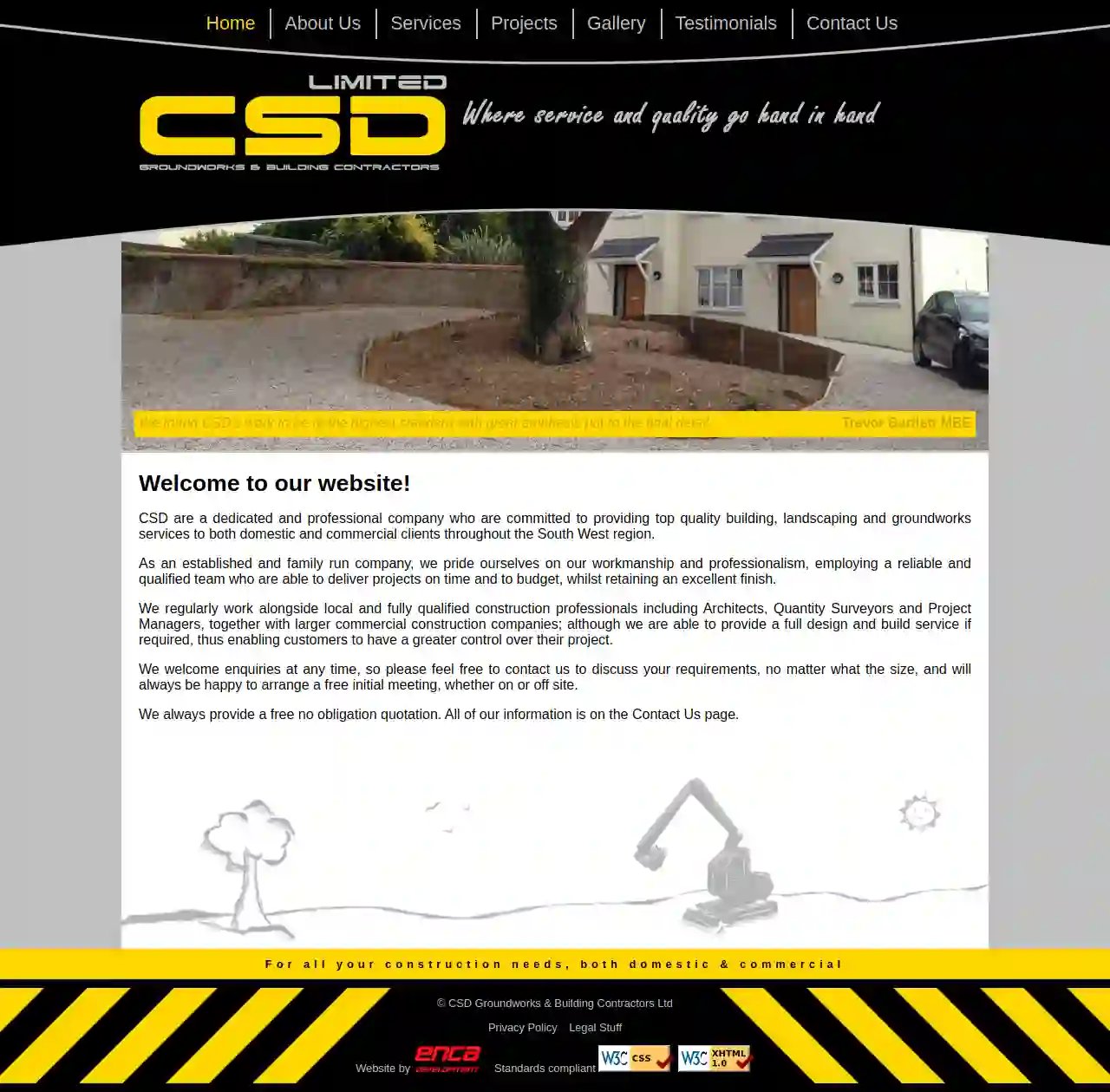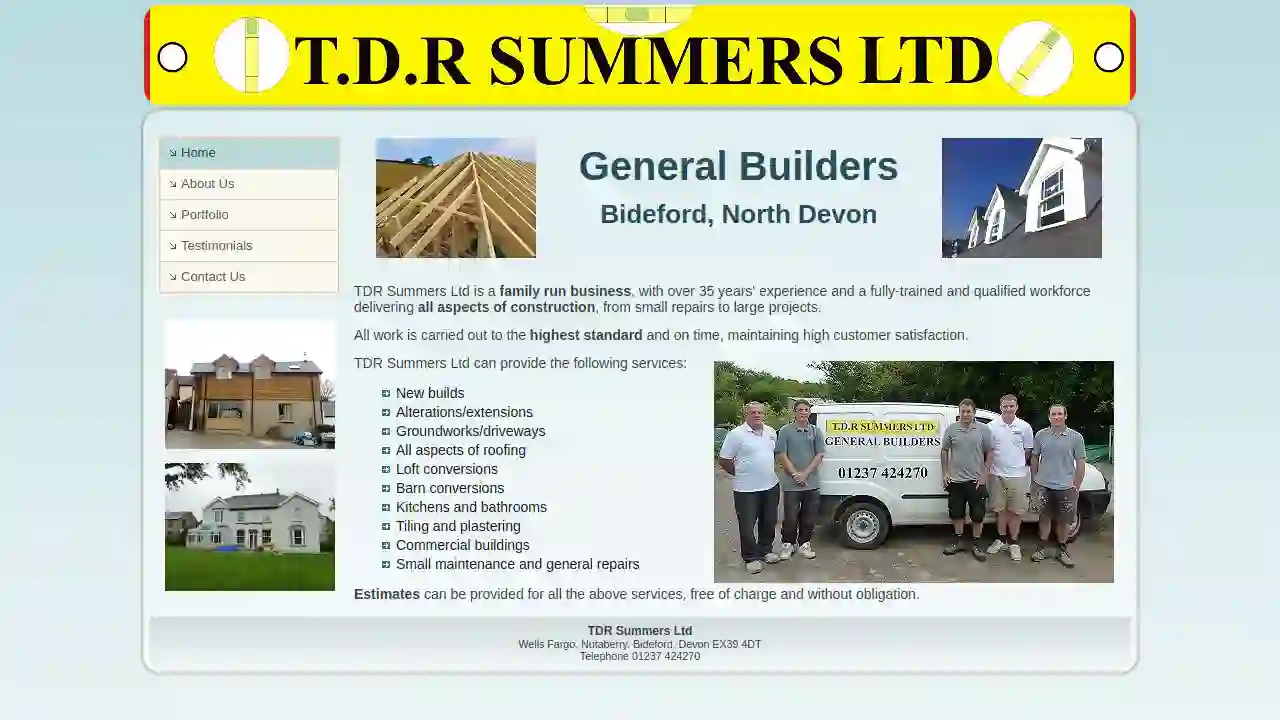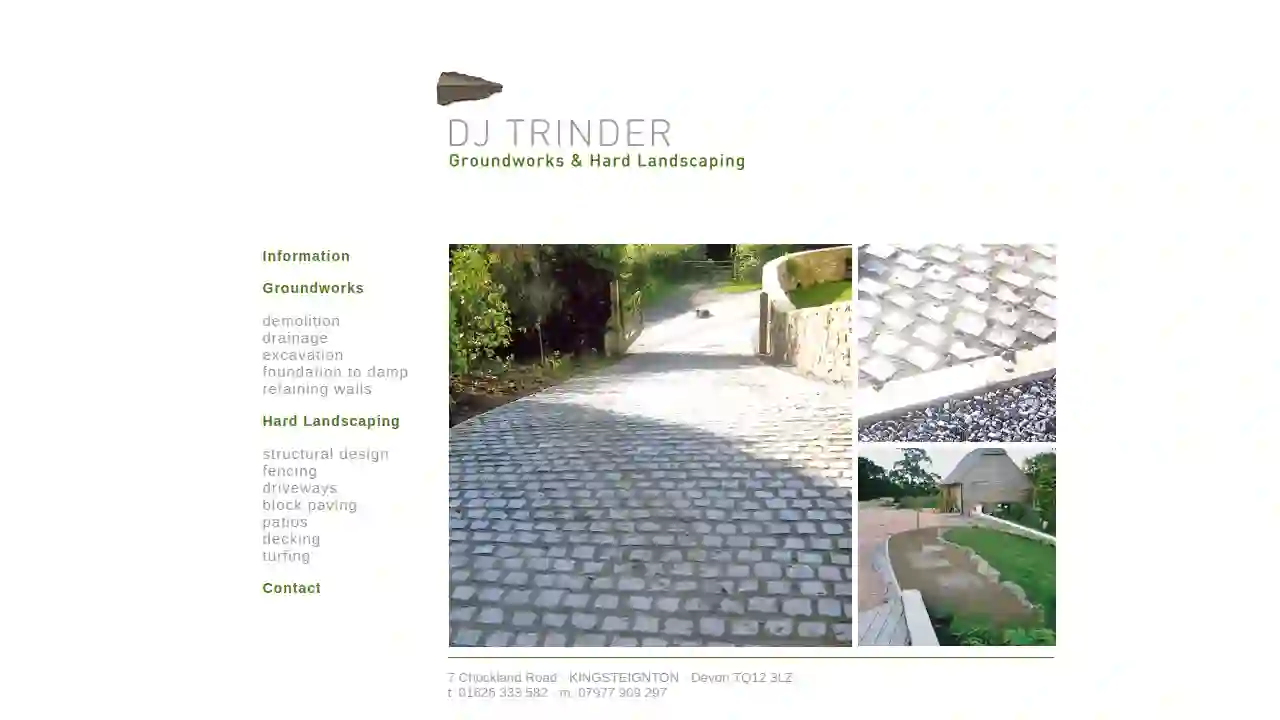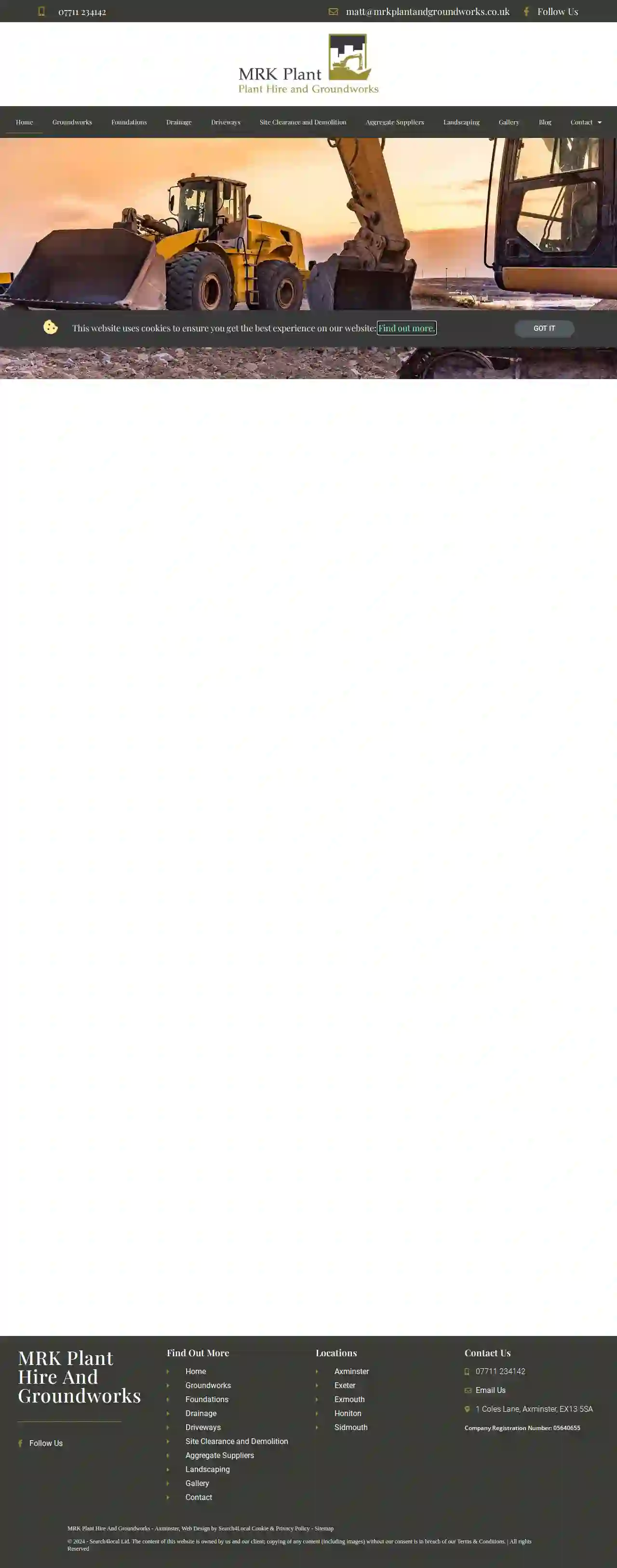Excavation Contractors Honiton
Find Excavation Contractor in Honiton
Receive 3 FREE Excavation Company Near Me quotes for your project today! Compare profiles, reviews, accreditations, portfolio, etc... and choose the best deal.

CSD Groundworks & Building Contractors Ltd
51 reviewsExeter, GBAbout CSD CSD Groundworks & Building Contractors Ltd is a dedicated and professional company committed to providing top-quality building, landscaping, and groundworks services to both domestic and commercial clients throughout the South West region. Established and family-run, we take pride in our workmanship and professionalism, employing a reliable and qualified team capable of delivering projects on time and within budget, while maintaining an excellent finish. We regularly collaborate with local and fully qualified construction professionals, including Architects, Quantity Surveyors, and Project Managers, alongside larger commercial construction companies. We can also provide a full design and build service if required, giving customers greater control over their projects. We welcome inquiries at any time. Feel free to contact us to discuss your requirements, regardless of size. We're always happy to arrange a free initial meeting, whether on or off-site. We also offer free, no-obligation quotations.
- Services
- Why Us?
- Accreditations
- Testimonials
- Gallery
Get Quote
Knowle Hill Recycling Centre
3.549 reviewsKnowle Hill Recycling Centre, Exmouth, Knowle Hill Recycling CentreExmouth, EX8 5BP, GBKnowle Hill Recycling Centre Knowle Hill Recycling Centre is a convenient and efficient way to dispose of your unwanted waste. We offer a wide range of services, including: Recycling of a wide range of materials Disposal of chargeable waste A reuse shop where you can purchase reusable goods A van permit system for commercial vehicles We are committed to providing a safe and efficient service for all our users. Our site staff are on hand to provide assistance when reasonable, but they are unable to lift excessively heavy and/or awkward loads. Please ensure that your waste is separated before arriving at the site.
- Services
- Why Us?
- Gallery
Get Quote
Davie Construction Limited
53 reviewsElpico, Exeter Cross, Liverton, Elpico Exeter Cross, Liverton Devon, TQ12 6EY, GBBuilding traditional skills for the future Covering the Torbay, Teignbridge, Exeter and South Dartmoor areas, Davie Construction Limited has over 150 years of combined experience in building homes and extensions, as well as refurbishment and conversions of older properties. As a family business, we understand that not only are we building your home as you want it, but having work done to your home is an investment of your time, money and emotion. Most people don’t frequently have building work done to their home so it can be confusing and unsettling – that’s where we come in. We guide you through the process and explain every step so you’ll know what is happening. We will answer all your queries and want you to be confident in us and what we are doing.
- Services
- Why Us?
- Testimonials
- Gallery
Get Quote
Render Dry Ltd
5 Heath Hill, Heathfield, Newton Abott, Devon, TQ12 6SP, GBRender Dry Ltd Render Dry Ltd is a complete building and property maintenance service covering the South West. We offer a design and build service to suit all budgets, with a quality team of builders specializing in extensions, renovations, loft conversions, and barn conversions. We have many years of experience in the construction industry and cover all trades using our own team of tradesmen and local subcontracted tradesmen. We have worked with many clients in the South West on various projects, from maintenance contracts for Nursing Homes and Residential care homes to domestic clients seeking to build extensions, convert lofts, garages, and barns. We have also carried out many insurance contracts for a local loss adjuster firm and carry out many building repairs, ranging from leaking gutters to complete renovations. If you are looking for reliable, affordable, local, top quality tradesmen, then Render Dry are the team you need. We offer a complete building and maintenance service for commercial and domestic properties. Covering the South West. Design and build service to suit all budgets. Extensions, renovations, loft conversions, barn conversions. Please get in touch to discuss your requirements, as we're sure we can help.
- Services
- Why Us?
- Testimonials
- Gallery
Get Quote
Skyscape Construction
Skyscape ConstructionExeter, England, United Kingdom, Exeter, GBSkyscape Construction: Transforming Spaces with Excellence Skyscape Construction is a small, friendly construction company based in Devon, dedicated to creating outstanding buildings and spaces. With years of experience, our team of experts is committed to excellence, innovation, and sustainability in every project. We believe in building not just structures, but lasting relationships with our clients, by ensuring transparency, reliability, and exceptional customer service. From residential to commercial projects, Skyscape Construction is your partner in bringing your architectural dreams to life. Our journey began as individuals working for an employer, and has since expanded to a professional partnership based in the Southwest of England. We have established a reputation for excellence and innovation in every project we undertake. Our team members bring a wealth of expertise in carpentry, brick laying, groundwork’s, stone masonry, plastering, and landscaping. Each member is dedicated to delivering exceptional craftsmanship and attention to detail in every project. With a focus on transparency, reliability, and exceptional customer service, we take pride in offering tailored residential and commercial construction, as well as comprehensive renovations. Our commitment to excellence has earned us the trust of our clients leading to repeat business.
- Services
- Why Us?
- Gallery
Get Quote
T D R Summers Ltd
4.58 reviewsWells Fargo, Nutaberry, Bideford, Devon, EX39 4DT, GBTDR Summers - building a future for success Apprenticeships and vocational training at North Devon College are a family tradition for builders TDR Summers. Royston Summers started it all 34 years ago when he completed a City and Guilds in Building at the college. He has worked as a mason ever since, covering all aspects of the trade, working initially for AF Beer then AA Beer. Latterly he has been self employed for several years. Sons Tim and Dan Summers followed their father into the construction industry, supported by training at NDC. Tim, 27, completed the apprenticeship in Trowel Occupations, then an advanced apprenticeship and went on to higher education with an ONC in Building Studies. Brother Dan, 25, followed an apprenticeship path in Wood Occupations at foundation and advanced level, before going on to achieve an ONC in Building Studies and an HNC in Construction. Both students excelled in their separate vocations: Tim won the Lou Drake Award for Best Mason in 1998 Dan won the UCATT Cup for Woodworking (under 18 years) in 2001, the Tony Layzell Memorial Cup for Woodworking in 2002 and the Professional Studies Peter Stone Award in 2004 Tim says "I automatically wanted to do my apprenticeship to learn the family trade. The quality training at college had structure and complemented what I was learning on site". Dan added "You definitely need the combination of site and college training to succeed. I really enjoyed learning the theory alongside developing practical skills". Tim put his management talents to good use, deciding to set up a family business in 2004, with Royston joining in 2005. Dan joined in 2006 bringing his complimentary skills to the firm. Since then TDR Summers has grown from strength to strength and established itself as a reputable company through the combination of skilled craftsmen and the delivery of quality service to the local community. Work is mainly small residential extensions, some new builds and loft conversions. The commitment to providing excellent standards to customers is endorsed by the growing client base of satisfied customers. "We are very grateful to you once again for your services" Mr H, Fremington "Superb job .... we really are thrilled!" (Mrs T, Yelland). Now TDR Summers is growing with the additional skills of younger brothers Tom 16 and Jamie, 23, currently doing apprenticeships in Trowel and Wood Occupations respectively. Dan says "The business is doing extremely well and we have been able to take on two of our younger brothers as apprentices. It's great to see the family tradition continuing".
- Services
- Why Us?
- Our Team
- Testimonials
- Gallery
Get Quote
CAB Construction SW LTD
51 reviewsExeter, GBTransforming the South West with Timely, Efficient & Affordable Construction Solutions At CAB Construction SW Ltd, we are your reliable and experienced construction partner, catering to projects of all sizes across the South West of England. Whether it’s a small residential renovation or a large-scale commercial development, we have the expertise to deliver outstanding results. ABOUT US: As a fast-growing, family-run business based in Okehampton, Devon, we take immense pride in serving both domestic and commercial clients. With over 25 years of combined experience in the building and construction industries, our skilled team has forged strong partnerships with main contractors, local authorities, and private developers. RELIABLE SERVICE: The success of your project is our priority. We value prompt and responsive communication, ensuring your needs are met and deadlines are achieved. Count on us to deliver projects on time and within budget. EXPERTISE YOU CAN TRUST: When you choose CAB Construction SW, you benefit from the wealth of knowledge and experience possessed by our team. Across various sectors, we have tackled diverse construction challenges, making us adept at handling any project with precision and efficiency. FULLY INSURED FOR YOUR PEACE OF MIND: Safety and meticulous planning are ingrained in every aspect of our work. We are fully insured with Public Liability Insurance, assuring the protection of your property and work site throughout the construction process. No matter the scale of your project, CAB Construction SW is committed to providing the highest standard of service, superior craftsmanship, and attention to detail. Partner with us and let’s turn your construction vision into reality.
- Services
- Why Us?
- Testimonials
- Gallery
Get Quote
D J Trinder Groundworks
7 Chockland Road, KINGSTEIGNTON, TQ12 3LZ, GBAbout DJ Trinder DJ Trinder is a family-run business with over 20 years of experience in the construction industry. We offer a wide range of services, from groundworks and demolition to landscaping and fencing. We are committed to providing our clients with high-quality workmanship and excellent customer service. Our Services We offer a wide range of services to meet your needs, including: Groundworks Demolition Drainage Excavation Foundation to damp Retaining walls Hard Landscaping Structural design Fencing Driveways Block paving Patios Decking Turfing Our Team Our team of experienced and qualified professionals is dedicated to providing you with the best possible service. We are committed to working closely with our clients to ensure that their projects are completed to the highest standards. Our Commitment We are committed to providing our clients with: High-quality workmanship Excellent customer service Competitive prices A professional and reliable service
- Services
- Why Us?
- Gallery
Get Quote
A and M Groundworks | Building Contractors Exeter
3.928 reviewsExeter, GBGroundworks Contractors in Exeter Initiating any construction project begins with establishing a solid foundation. This process involves deep excavations, levelling, grading, soil stabilisation, and the installation of underground drainage systems. Achieving robust groundwork requires meticulous attention to detail, expert supervision, and precise execution – hallmarks of A&M Groundworks. With a wealth of experience in delivering top-notch groundworks in Exeter, we handle a wide range of projects, helping private and public sectors augment land utilisation by employing state-of-the-art technology. Contact us for a quote and discuss your project with our professional engineers to achieve the highest quality finish at the most competitive price. More About Us 15 Years Experience Services Bespoke Work by Craftsmen
- Services
- Why Us?
- Testimonials
- Gallery
Get Quote
MRK Plant
51 reviews1 Coles Lane, Axminster, EX13 5SA, GBGroundwork Contractors Seaton If you need groundwork contractors in Seaton, look no further than our skilled and qualified team. With 20 years of combined experience, our family-run company covers all aspects of groundwork throughout East Devon. From property foundations to controlled demolitions, you can count on us for exceptional services and competitive prices. We are also trained CPCS operators, so all of our machinery will be handled safely and responsibly at all times on your property.For more information on our services in Seaton, Sidmouth, Honiton and the surrounding areas, get in touch with us today on 07711 234142.
- Services
- Why Us?
- Gallery
Get Quote
Over 13,059+ Excavation Businesses onboarded
Our excavation companies operate in Honiton and surroundings!
ExcavationHQ has curated and vetted Top Excavation Companies near Honiton. Find the most trustworthy pro today.
Frequently Asked Questions About Excavation Contractors
- Project Type and Size: Ensure the contractor has experience handling projects similar to yours in scale and complexity.
- Reputation and Reviews: Check online reviews and testimonials, and request references from previous clients.
- Licensing and Insurance: Verify that the contractor is properly licensed and insured to protect you from liability.
- Equipment and Resources: Confirm that they have the necessary equipment and resources for your project's needs.
- Communication and Transparency: Choose a contractor who communicates clearly, provides detailed estimates, and keeps you informed throughout the project.
- Safety Record: Inquire about their safety protocols and track record to ensure a safe work environment.
- Price: While price is important, it shouldn't be the only deciding factor. Balance affordability with experience, reputation, and quality of service.
- Utility Locates: Contact your utility companies to mark the locations of underground lines before excavation begins. This is usually a free service.
- Hand Digging: Excavate carefully by hand near marked utility lines to avoid damage.
- Potholing: Digging small test holes to expose and verify utility depths and locations.
- Safe Distances: Maintaining a safe distance between excavation equipment and marked utility lines.
- Vacuum Excavation: Using vacuum excavation techniques to expose utilities without digging, reducing the risk of damage.
- Project Size and Scope: The larger and more complex the excavation, the higher the cost.
- Soil Type: Different soil types require different equipment and techniques, impacting costs. Rocky or clay-rich soil can be more expensive to excavate than loose soil.
- Accessibility: Difficult-to-access sites might require specialized equipment or additional labor, increasing expenses.
- Disposal Costs: Hauling away excavated material (soil, rocks, etc.) to disposal sites incurs additional fees.
- Permits and Inspections: Depending on local regulations, permits and inspections might be required, adding to the overall cost.
- Topsoil Removal: Stripping the fertile topsoil layer from a site, often preserving it for landscaping.
- Trench Excavation: Digging long, narrow trenches for utilities (pipes, cables) or foundations.
- Basement Excavation: Removing earth to create a space for a basement beneath a structure.
- Pool Excavation: Digging a precise hole for installing a swimming pool.
- Roadway Excavation: Removing earth and preparing the ground for road construction.
- Demolition Excavation: Clearing debris and preparing the site after demolition.
- Channel Excavation: Creating channels for drainage or irrigation.
How do I choose the right excavation contractor for my project?
How do you protect utilities during excavation?
How much does excavation cost?
What are the different types of excavation?
How do I choose the right excavation contractor for my project?
- Project Type and Size: Ensure the contractor has experience handling projects similar to yours in scale and complexity.
- Reputation and Reviews: Check online reviews and testimonials, and request references from previous clients.
- Licensing and Insurance: Verify that the contractor is properly licensed and insured to protect you from liability.
- Equipment and Resources: Confirm that they have the necessary equipment and resources for your project's needs.
- Communication and Transparency: Choose a contractor who communicates clearly, provides detailed estimates, and keeps you informed throughout the project.
- Safety Record: Inquire about their safety protocols and track record to ensure a safe work environment.
- Price: While price is important, it shouldn't be the only deciding factor. Balance affordability with experience, reputation, and quality of service.
How do you protect utilities during excavation?
- Utility Locates: Contact your utility companies to mark the locations of underground lines before excavation begins. This is usually a free service.
- Hand Digging: Excavate carefully by hand near marked utility lines to avoid damage.
- Potholing: Digging small test holes to expose and verify utility depths and locations.
- Safe Distances: Maintaining a safe distance between excavation equipment and marked utility lines.
- Vacuum Excavation: Using vacuum excavation techniques to expose utilities without digging, reducing the risk of damage.
How much does excavation cost?
- Project Size and Scope: The larger and more complex the excavation, the higher the cost.
- Soil Type: Different soil types require different equipment and techniques, impacting costs. Rocky or clay-rich soil can be more expensive to excavate than loose soil.
- Accessibility: Difficult-to-access sites might require specialized equipment or additional labor, increasing expenses.
- Disposal Costs: Hauling away excavated material (soil, rocks, etc.) to disposal sites incurs additional fees.
- Permits and Inspections: Depending on local regulations, permits and inspections might be required, adding to the overall cost.
What are the different types of excavation?
- Topsoil Removal: Stripping the fertile topsoil layer from a site, often preserving it for landscaping.
- Trench Excavation: Digging long, narrow trenches for utilities (pipes, cables) or foundations.
- Basement Excavation: Removing earth to create a space for a basement beneath a structure.
- Pool Excavation: Digging a precise hole for installing a swimming pool.
- Roadway Excavation: Removing earth and preparing the ground for road construction.
- Demolition Excavation: Clearing debris and preparing the site after demolition.
- Channel Excavation: Creating channels for drainage or irrigation.